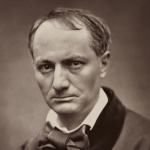CHORUS
Come we shepherds whose blest sight
Hath met love’s noon in nature’s night;
Come lift we up our loftier song
And wake the sun that lies too long.
He slept, and dreamt of no such thing,
While we found out heav’n’s fairer eye,
And kiss’d the cradle of our King.
Tell him he rises now too late
To show us aught worth looking at.
Tell him we now can show him more
Than he e’er show’d to mortal sight,
Than he himself e’er saw before,
Which to be seen needs not his light.
Tell him, Tityrus, where th’ hast been;
Tell him, Thyrsis, what th’ hast seen.
TITYRUS
Gloomy night embrac’d the place
Where the Noble Infant lay;
The Babe look’d up and show’d his face,
In spite of darkness, it was day.
It was thy day, Sweet! and did rise
Not from the east, but from thine eyes.
CHORUS
It was thy day, Sweet! and did rise
Not from the east, but from thine eyes.
THYRSIS
Winter chid aloud, and sent
The angry North to wage his wars;
The North forgot his fierce intent,
And left perfumes instead of scars.
By those sweet eyes’ persuasive pow’rs,
Where he meant frost, he scatter’d flow’rs.
CHORUS
By those sweet eyes’ persuasive pow’rs,
Where he meant frost, he scatter’d flow’rs.
BOTH
We saw thee in thy balmy nest,
Young dawn of our eternal day!
We saw thine eyes break from their east
And chase the trembling shades away.
We saw thee, and we bless’d the sight,
We saw thee by thine own sweet light.
TITYRUS
Poor World, said I, what wilt thou do
To entertain this starry stranger?
Is this the best thou canst bestow,
A cold, and not too cleanly, manger?
Contend, ye powers of heav’n and earth,
To fit a bed for this huge birth.
CHORUS
Contend, ye powers of heav’n and earth,
To fit a bed for this huge birth.
THYRSIS
Proud World, said I, cease your contest,
And let the Mighty Babe alone;
The phoenix builds the phoenix’ nest,
Love’s architecture is his own;
The Babe whose birth embraves this morn,
Made his own bed ere he was born.
CHORUS
The Babe whose birth embraves this morn,
Made his own bed ere he was born.
TITYRUS
I saw the curl’d drops, soft and slow,
Come hovering o’er the place’s head,
Off’ring their whitest sheets of snow
To furnish the fair Infant’s bed.
Forbear, said I, be not too bold;
Your fleece is white, but ’tis too cold.
CHORUS
Forbear, said I, be not too bold;
Your fleece is white, but ’tis too cold.
THYRSIS
I saw the obsequious Seraphims
Their rosy fleece of fire bestow;
For well they now can spare their wings,
Since Heav’n itself lies here below.
Well done, said I, but are you sure
Your down so warm will pass for pure?
CHORUS
Well done, said I, but are you sure
Your down so warm will pass for pure?
TITYRUS
No no, your King’s not yet to seek
Where to repose his royal head;
See see, how soon his new-bloom’d cheek
’Twixt’s mother’s breasts is gone to bed.
Sweet choice, said we! no way but so,
Not to lie cold, yet sleep in snow.
CHORUS
Sweet choice, said we! no way but so,
Not to lie cold, yet sleep in snow.
BOTH
We saw thee in thy balmy nest,
Bright dawn of our eternal day!
We saw thine eyes break from their east,
And chase the trembling shades away.
We saw thee, and we bless’d the sight,
We saw thee, by thine own sweet light.
CHORUS
We saw thee, and we bless’d the sight,
We saw thee, by thine own sweet light.
FULL CHORUS
Welcome, all wonders in one sight!
Eternity shut in a span;
Summer in winter; day in night;
Great little one, whose all-embracing birth
Lifts earth to heaven, stoops heav’n to earth.
Welcome; though nor to gold nor silk,
To more than Caesar’s birthright is;
Two sister seas of virgin-milk,
With many a rarely temper’d kiss,
That breathes at once both maid and mother,
Warms in the one, cools in the other.
Welcome, though not to those gay flies
Gilded i’ th’ beams of earthly kings,
Slippery souls in smiling eyes;
But to poor shepherds, homespun things,
Whose wealth’s their flock, whose wit, to be
Well read in their simplicity.
Yet when young April’s husband-show’rs
Shall bless the fruitful Maia’s bed,
We’ll bring the first-born of her flow’rs
To kiss thy feet and crown thy head.
To thee, dread Lamb! whose love must keep
The shepherds more than they the sheep.
To thee, meek Majesty! soft King
Of simple graces and sweet loves,
Each of us his lamb will bring,
Each his pair of silver doves;
Till burnt at last in fire of thy fair eyes,
Ourselves become our own best sacrifice.



















Comment form: